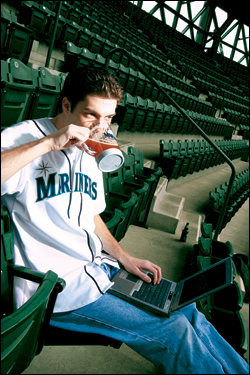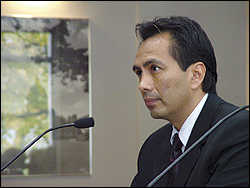The Chicago Cubs tried to turn around decades of despair by publicly blowing up a baseball. The Seattle Mariners should do the same by publicly blowing up—the Seattle Mariners. That’s what Seattle’s stat-head contingent says, and because they were right about how bad the 2004 team would be (see “The New Bleacher Bums,” March 31)—in the face of acidic criticism and arrogant dismissal—their words carry the most moral authority around Safeco Field these days. They see a clear long-term remedy, though they are less than united on specific short-term fixes. What they do agree on is that 2004 is a lost cause.
Most, like Derek Zumsteg, a Baseball Prospectus (www.baseballprospectus.com) analyst who also writes for the USS Mariner blog (ussmariner.blogspot.com), don’t mince words. “They need to clean house and fire everyone now,” says Zumsteg. He’s talking about everyone involved in decisions that deep-sixed this season for Seattle fans, including managing partner Howard Lincoln. Says amateur baseball analyst and fellow blogger David Cameron: “Major League Baseball has 120 years of history that paint a picture of how the game works. The Mariners ignored that history and placed their value in things that could not be measured, believing they could put their hope in magic and chemistry, seeing 2001 as the ultimate achievement of a baseball team. They chased a dream, ignoring the hard reality that talent wins baseball games. Talent was sacrificed for other characteristics.” Notably, “veteran leadership,” “clubhouse chemistry,” “clutch performance,” and other mystic nonsense.
So once new leadership is in place, what should the new plan be? Essentially, trade every veteran with market value who can be traded. (Those who can’t be dealt include Edgar Martinez, John Olerud, Dan Wilson, and Jamie Moyer.) Release those who can’t be dealt and for whom intriguing replacements wait at Triple-A Tacoma. The “out” list should include shortstop Rich Aurilia, alleged center fielder Randy Winn, starting pitchers Freddy Garcia, Ryan Franklin, and Gil Meche, relievers Mike Myers, Ron Villone, and Eddie Guardado (his trade value might never be higher), reserve Quinton McCracken, and possibly third baseman Scott Spiezio. The “in” list, for at least an extended trial, should include major leaguers and minor leaguers alike: starters Bobby Madritsch and Clint Nageotte (who might make a better reliever), bullpen lefty George Sherrill, third baseman Justin Leone, first baseman Bucky Jacobsen (a potentially ideal platoon complement to Olerud at first base), and outfielder Jamal Strong. Nageotte, fellow starter Travis Blackley, and others at lower minor-league levels in the organization could make tasty trade bait.
As for manager Bob Melvin, who’s taken the brunt of criticism for the Mariners’ face plant, giving him a contract extension was inherently foolish, but “Buntin’ Bob,” as USS Mariner writers call him, should be given more time to mend his out-wasting, platoon-punting, bullpen-bungling ways—with the stern understanding that his in-game management weaknesses aren’t offset by “clubhouse chemistry.”
The result? Finding out which of the whiz kids on the farm can cut it in the majors; chopping the payroll by $25 million or more; and squirreling away those financial nuts to spend next off-season on some of the true impact players on the free-agent market: Carlos Beltran, anyone? Nomar Garciaparra? J.D. Drew? Matt Clement? Kevin Millwood? “By dumping nearly every player under contract past 2004, the Mariners can enter the off-season with an unparalleled budget and rebuild the team correctly,” Cameron says.
But for that to happen, Lincoln has to either fire his lieutenants—General Manager Bill Bavasi chief among them—and replace them with competent thinkers capable of embracing new strategies, or he has to have the humility to step aside in the best interests of what is, right now, a staggeringly awful, cost-inefficient club.





